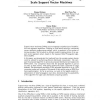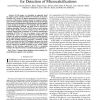1118 search results - page 45 / 224 » Data Mining via Support Vector Machines |
FSS
2007
14 years 9 months ago
2007
The relationship between support vector machines (SVMs) and Takagi–Sugeno–Kang (TSK) fuzzy systems is shown. An exact representation of SVMs as TSK fuzzy systems is given for ...
CORR
2008
Springer
14 years 10 months ago
2008
Springer
Support vector machines (SVMs) are an extremely successful type of classification and regression algorithms. Building an SVM entails solving a constrained convex quadratic program...
TMI
2002
14 years 9 months ago
2002
In this paper, we investigate an approach based on support vector machines (SVMs) for detection of microcalcification (MC) clusters in digital mammograms, and propose a successive ...
ICML
2006
IEEE
15 years 10 months ago
2006
IEEE
In machine learning problems with tens of thousands of features and only dozens or hundreds of independent training examples, dimensionality reduction is essential for good learni...
PR
2006
14 years 9 months ago
2006
In many pattern recognition applications, high-dimensional feature vectors impose a high computational cost as well as the risk of "overfitting". Feature Selection addre...



